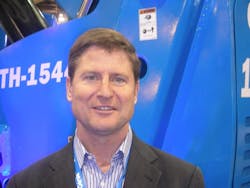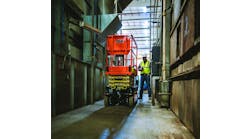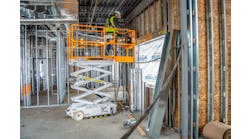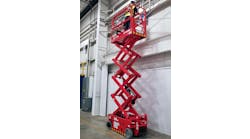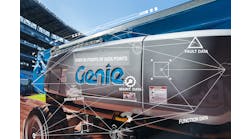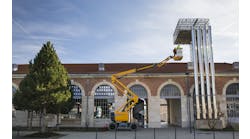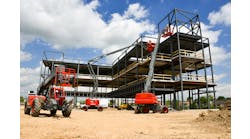At the recent Rental Show in Las Vegas, RER had the opportunity to talk with Matt Fearon, new president of Terex AWP, about increasing rental demand, Tier 4 changes, Genie’s new relationship with Disney and the company’s continuing emphasis on product support.
RER: It seems that overall the market is going good, areas such as non-residential and residential construction are improving.
Fearon: Yes. Each of the regions is a little different but we’re seeing that economies are definitely improving. And rental companies are healthy. You look at their numbers, everybody went through tough times, and they are starting to get healthier now. Their fundamentals are good, they are replacing fleet, so that’s good for us as a manufacturer. Interest rates are at an all-time low. Banks are getting more willing to support the smaller rental companies that had a hard time getting capital, to me that’s one of the differences from 18 months ago.
Housing is kicking in; it looks like housing starts are starting to pick up. You add all that up and we’re pretty optimistic.
RER: It seems that issues such as the fiscal cliff are not as extreme a concern as before.
People got jittery around August of last year and they started holding back a little bit. I’m hoping we don’t see that this year and that we can run through the whole year.
RER: Are you getting the sense from the customers that it’s mostly replacement type spending or is it growth spending as well?
It is beginning to shift. Certainly replacement has been driving it and that’s going to continue, but they’re starting to add to their fleets as well. So we’re starting to see that as their utilization is high. When the phone rings and they are short machines, they don’t like that, so they start to add. So it is starting to shift.
RER: How is your capacity? Are you still in the just-in-time sort of mode or are you developing more of a backlog of inventory?
We are in good shape. We came into this show with inventory available, which is a good sign. It depends on the model, but lead times are reasonable right now on most models. That varies with the market. When the market is very strong, lead times are a little bit longer in North America, but we’re adding capacity aggressively as part of our plan.
RER: You were talking today about more production capacity around the world. You’ve added some capability in China?
We built a factory over there, we’ve had it open for two years now, and we’re starting to get that up and going. We’ve got Coventry in the U.K., all of our electric scissors for Europe get made in the U.K. That’s a lot of machines. Then in Italy we have a telehandler factory and they also make the articulated products, the Z45 and Z51. Those are big-volume products.
RER: What are some of the new machines you’re particularly excited about?
The 15K telehandler that we’re showing at the booth. We are seeing that there’s definitely a shift in the market now, people are moving towards the bigger telehandlers. We’re seeing a lot of interest in that machine.It’s brand new. It will go into production in a couple of months. We’re doing the final testing on it.
RER: How is the supply chain these days? Are you having any difficulty getting components?
We haven’t had any problems. I think the biggest supply-chain-related issue is going to be Tier 4 transition. It’s going to be coming in over the next 18 months. That will be a big transition.
RER: Will that involve significant retrofitting of machines to accommodate Tier 4 or will they be pretty similar?
They will be pretty similar. If you look at the 45 that’s in the booth, it looks like the same Z45 but it’s set up for the bigger engine. People who are close to machines will notice it. To other people it will be pretty subtle on some of them. It does require modifications to the machines. So you have to do a whole bunch of new product development to get the new engines in. Everybody is going through the same thing. It’s a big thing for the industry. We’re not the only ones.
RER: Will there be price increases?
Yes, the engines are definitely more expensive, but it’s also the way you package them. We’re going to pass the costs on. We’ve come out with our ’13 pricelist and said, “Here’s the 2013 prices and when we switch to the Tier 4 there will be an additional upcharge.” Some of the engine guys haven’t even passed on their pricing to us. So, a lot of people want to know what percentages, well, it depends on how many other things we had to do, not only the engine. It’s not trivial, it’s several thousand dollars.
RER: I think markets have known price hikes would be coming, so it’s not a big surprise.
No, it’s not a surprise, but when they fill out a purchase order, it’s still a surprise.
RER: You have a new online training program. Can you tell me more about that?
Manufacturers have requirements that we’re responsible for, so do rental companies and ultimately end users have to be trained on how to use access equipment. And we see there’s a need for it and the training that’s out there and available is not getting to everybody. If you look at the number of people that are getting the thorough training, we think it could be improved, so we tried to create a vehicle that can make it much easier because you don’t have to fly in to some site to have a couple of days of training. That’s hard on rental companies, so what we see is there’s a huge improvement in safety just by being aware of how the machine works, how are you supposed to operate, what do you watch out for.
Also it’s great for rental companies because there’s a lot of damage to machines from misuse. Rental companies can avoid a lot of costs by increasing training. So there are some real advantages to putting an effort around training and we tried to set it up so we can use our dealers and our rental company partners to give them an easy way to get out to a wider audience of people. So we’re excited about it and the feedback from customers has been really good.
RER: Was the idea in response to customer request?
Yeah we started looking at what’s available to them. How are they doing it today? It’s something that all rental companies take seriously and we just started putting our heads together on what would work, what would make sense. There’s getting them in a classroom versus in front of a computer. It’s very well done, it’s interactive and it’s got music and there’s other stuff that keeps people engaged, so we think that it’s going to help quite a bit.
RER: People learn in different ways, not everyone responds in a lecture situation.
Yes. And there’s a practical piece and that’s where you say, “OK, you’ve been through the training, you have your piece of paper, show me where the limit switches are, show me how you bring someone down. If the machine dies, the manual lowering, show me how you would do that.” You can really make sure they understand. It’s one thing to get the computer piece done, but the practical side is really important. Rental companies have a lot of pressure on them, it’s hard to do the onsite training. We think the program is going to make it easier. A lot of times people deliver the machines and they have to do the run-through with the operators, [figure out] who’s there and how thoroughly have they been trained. We’re trying to get to where it hits more people. I think there’s going to be a lot of demand for it.
RER: So end users can get the same training?
Yes. We’re trying to make it easy for the rental companies. We’re trying to make it easy for the end users too. Today we were with a customer and we started talking about it and he said “That’s exactly what we need.” Rental companies need this type of thing.
What have been the strongest markets lately?
North America and Australia have been particularly good. Brazil, in the second half of 2012, started to really be good. Europe was not as bad as everybody thought; they are getting into the beginning of the replacement cycle. They’re starting to see that their utilization rates are going up, their fleets are very old. They have disposed of a lot and dropped their fleet sizes. They weren’t huge numbers but we saw some growth in Europe. So that’s a good sign. I think it will be slow, but if you look at the markets that move the needle, it’s North America and Europe.
You got Brazil and Asia Pacific and other places, they are all improving, but it’s really North America and Europe that are strong. Maybe not from a percentage standpoint, but if you look at overall volume, those are the markets. We’re seeing good growth in a lot of different places.
RER: What about China?
China is slow. We started growing in China in the shipyards in 2008, so the market is developing. If it’s going to develop it’s just a matter of time. So we’re positioned well to do that. It’s not growing as fast as we’d hoped, but it is growing and we’re continuing, we’re all in. Other parts of Asia Pacific as well are growing.
RER: Tell me about the new deal Terex AWP has with Disney.
The Disney alliance is a great match. If you look at their values and ours, they are all about safety on their sites; they are all about continuous improvement in their premises and the way they train their staffs. So the companies’ values and direction line up really well. And with the ESPN complex becoming a preferred supplier; if you ever walk around their complex, you see the number of pieces of access equipment! And it works both ways, they have our support on the equipment side and then we have access to some of the abilities they have around videoing. When we do customer events, we can use the premises there, so there are a lot of pieces to it. It’s about building thebrand and associating our brand name with somebody who might not be the normal place that you would think. So it’s a bit of a shift for us. We have good acceptance of our brand and we want to make sure that we’re managing and getting the most out of it.
RER: Have you been working with Disney as a customer for some years?
It’s through rental companies, we don’t go direct to them, it’s through the rental companies that are in the region, but we’re going to be the preferred lifts on their premises. It’s probably been a year, year-and-a-half that we’ve been working on the alliance, the relationship, and how it’s going to work, what’s in it for them, what’s in it for us. And can this work? They have major companies as alliance partners, they take it very seriously, you have to bring something to the table, who are you, what are you about. So it’s been very thoughtful on both sides and we think it’s win-win.
RER: So they’ll use Genie booms to film at games, that sort of thing?
Yeah, they have the filming side of it, they’ll use them at the big high-profile events, you’ll see the Genies in there. And there’s also the facilities that they’re taking care of. That will be more like the normal applications you’d see anywhere, the convention centers, stuff like that, so there’s lots of different pieces to the relationship.
RER: Have your customers been involved in renting for film production?
We have. We offer flat black-painted booms, so they do a lot of lighting and they want to put things on the platforms and they do special stage setups and they pass it through product safety. For years we had special studio booms. It’s not huge but we’ve got it available if they call and they need one, we’ve got the special paint.
RER: Are you still putting a lot of emphasis into the product support area?
Yes, as long as I’m here you’ll always see us putting an emphasis on that, always, we kind of lead with that, we put a lot of effort on that. As we go in to new countries, it’s one thing to sell a lift, but when the phone starts ringing you have to be on it. So we make sure we have knowledgeable experienced people to train the staff, to get them to be able to get the customers’ sense of urgency when the phone rings. You get on it and don’t stop until it’s fixed. If they need service, we put a huge emphasis on that. It really works. It’s who we are. When we talk about our core values, what do we bring, there are two things: Customer responsiveness and continuous improvement. Those are the things I just keep driving through and I’ll keep doing that.

